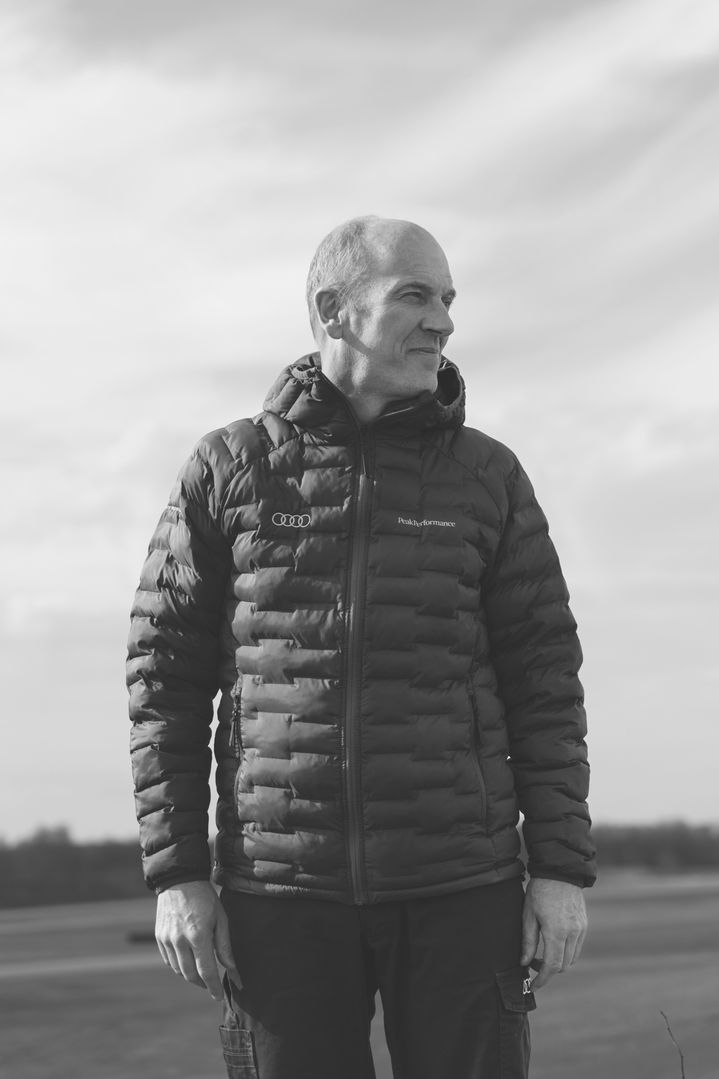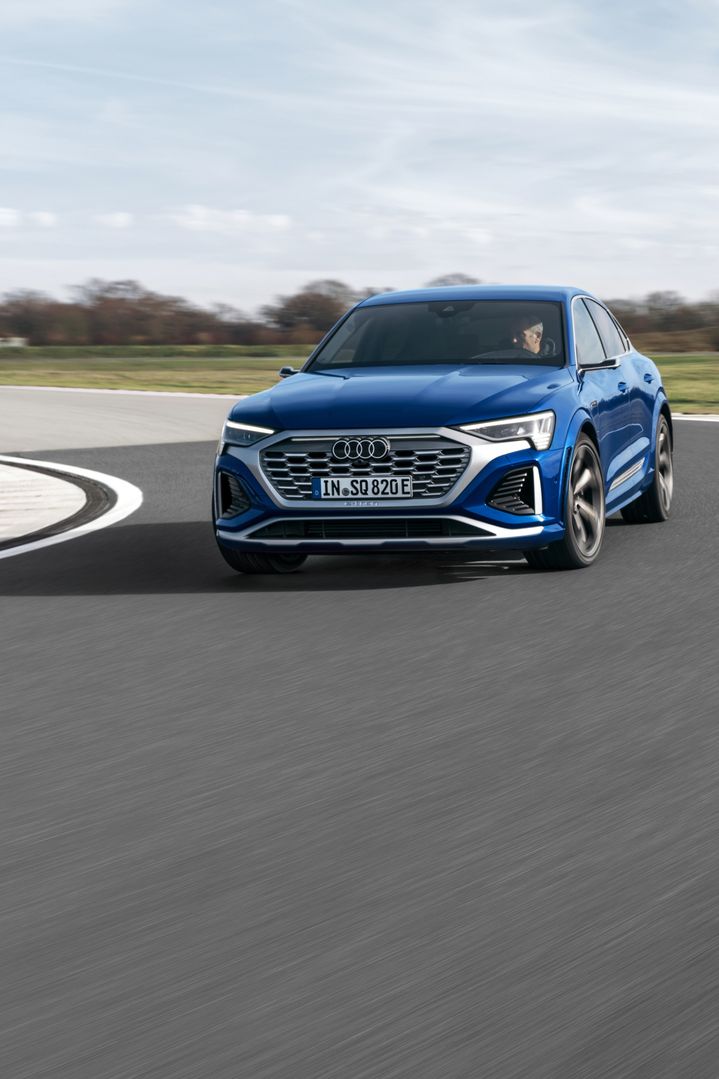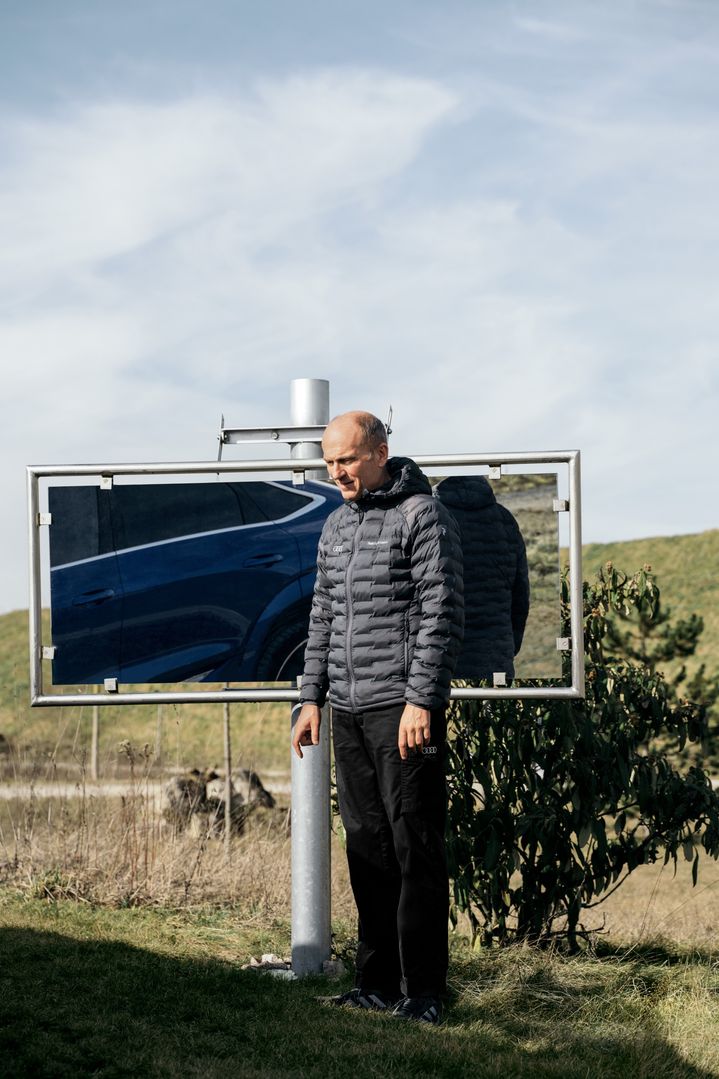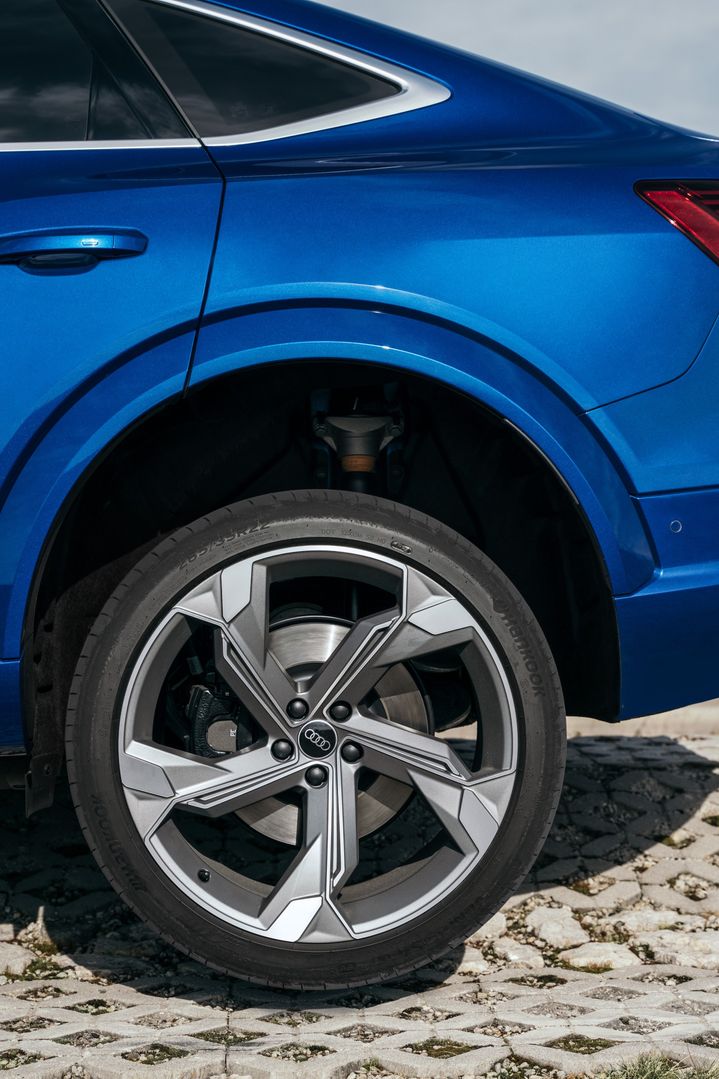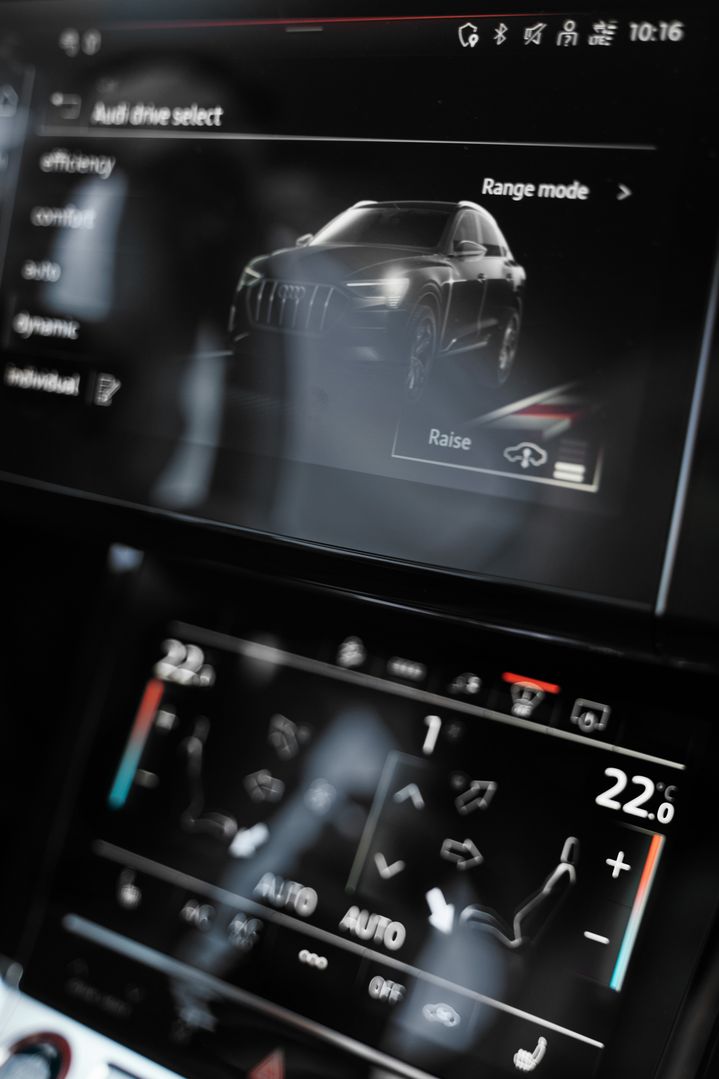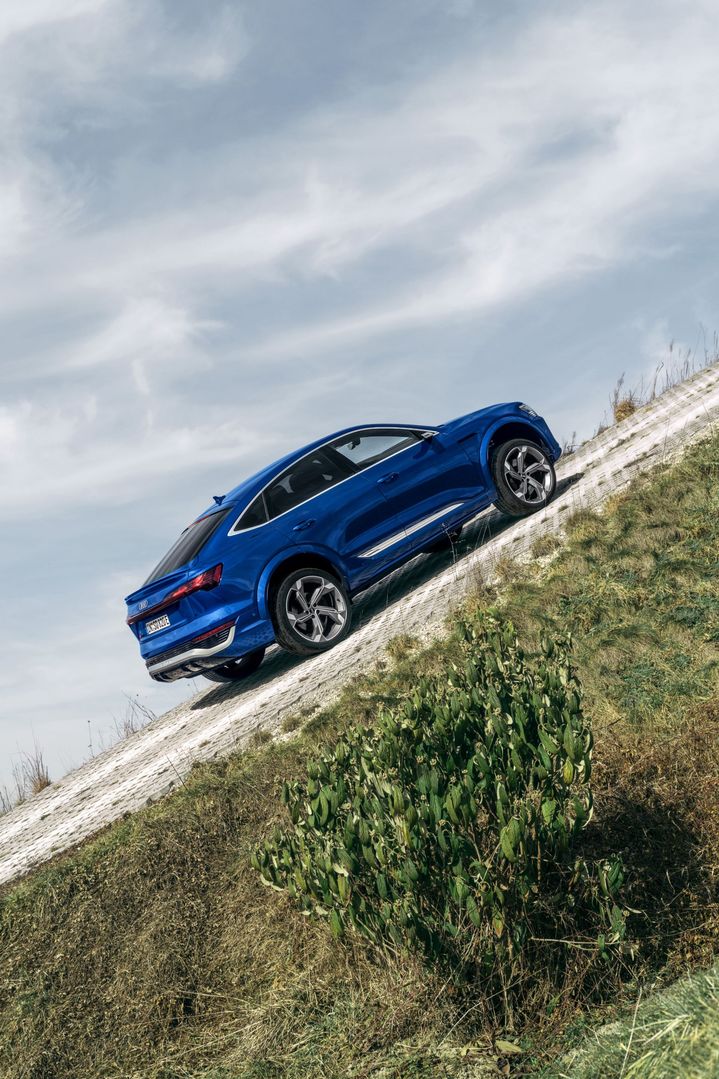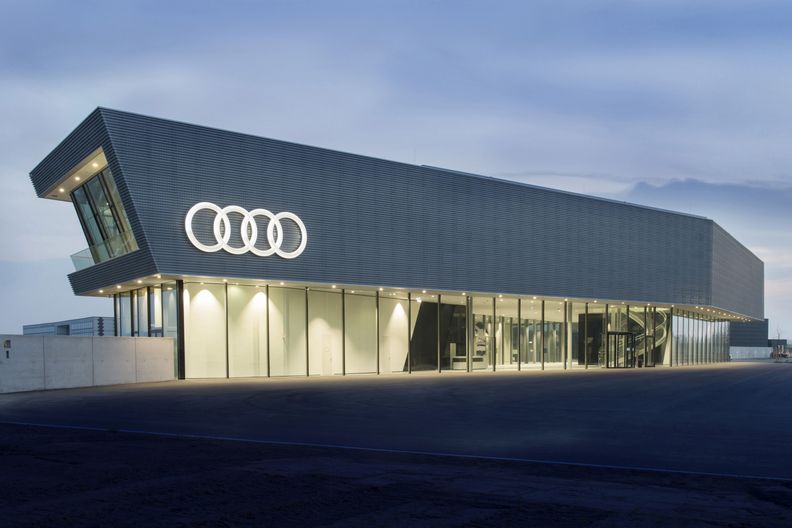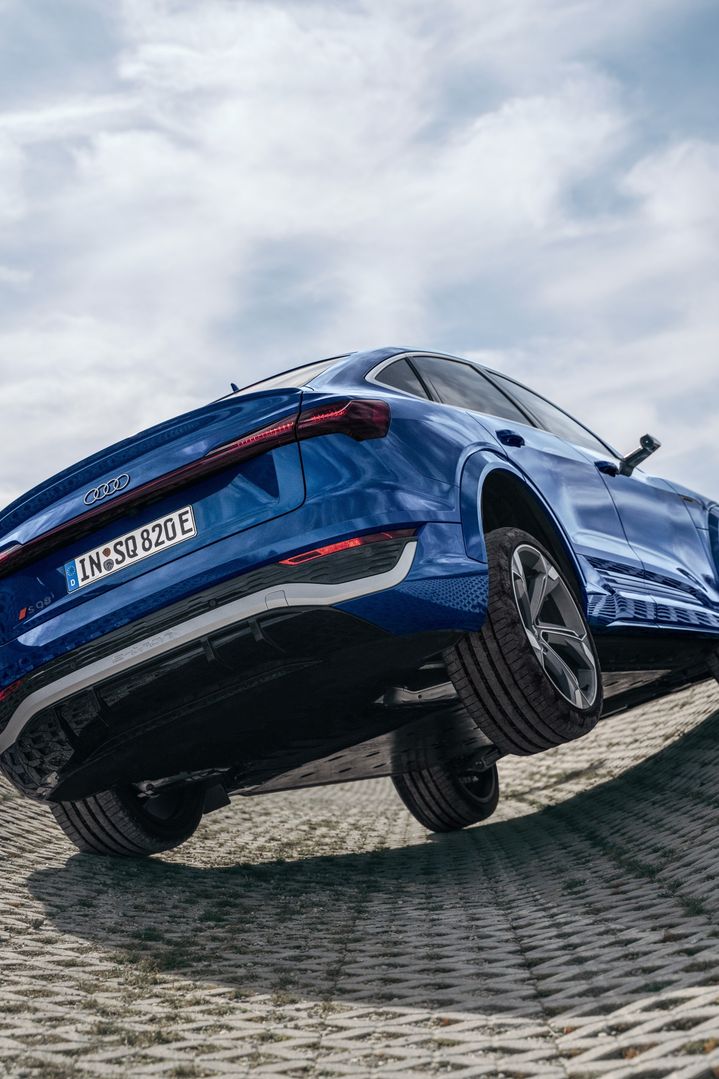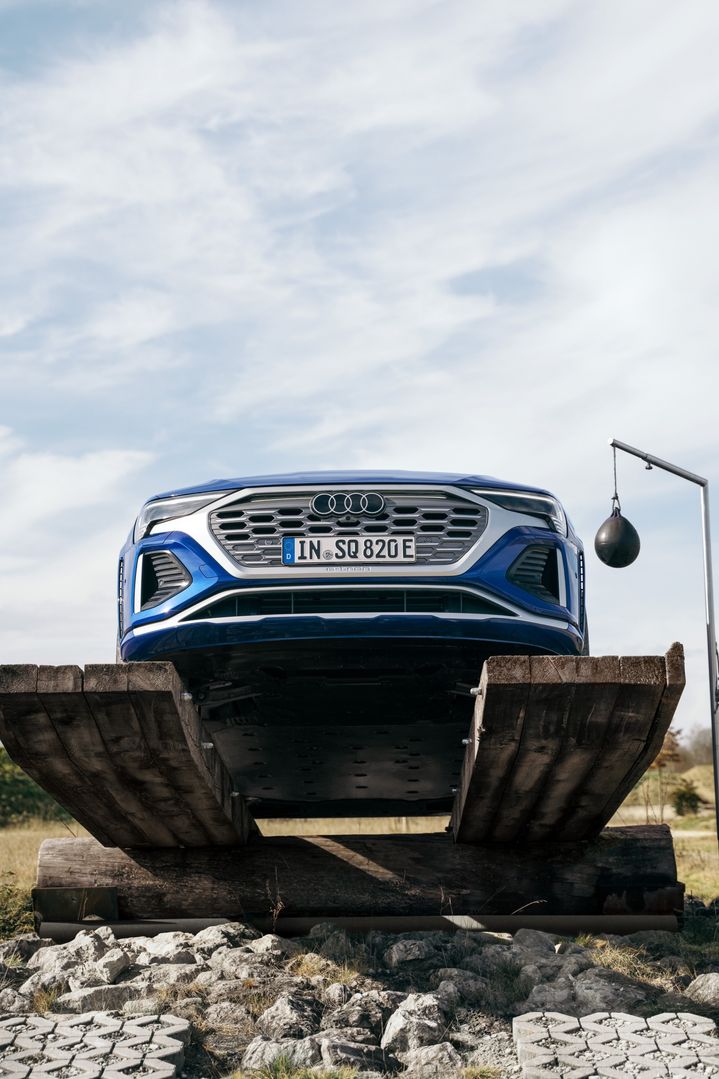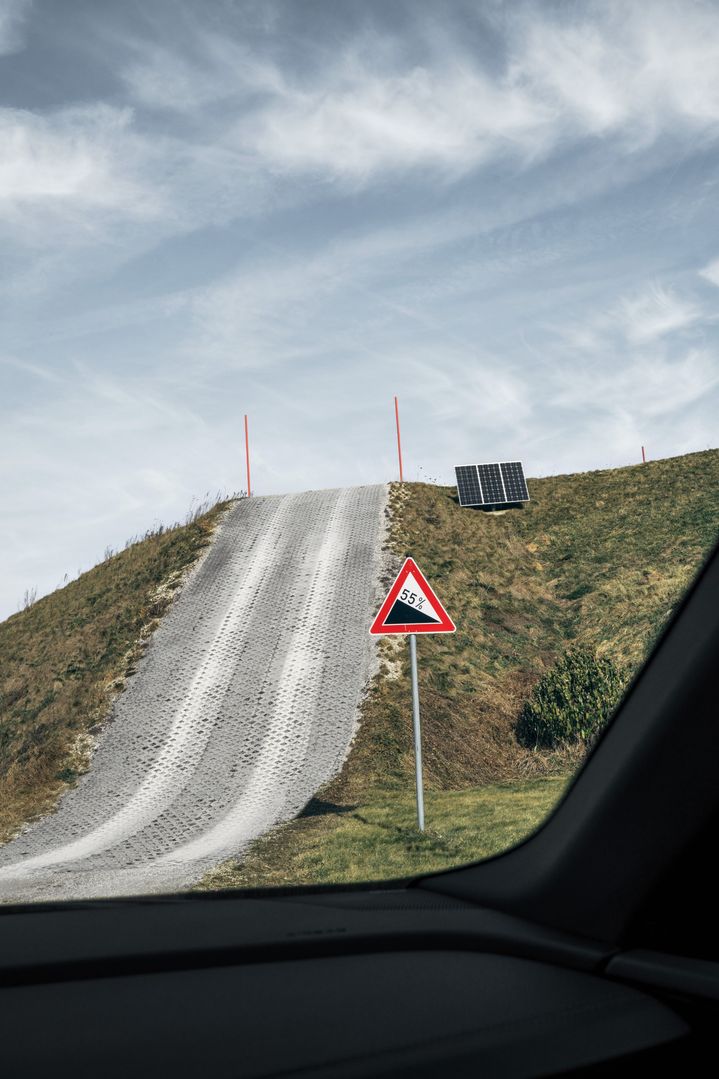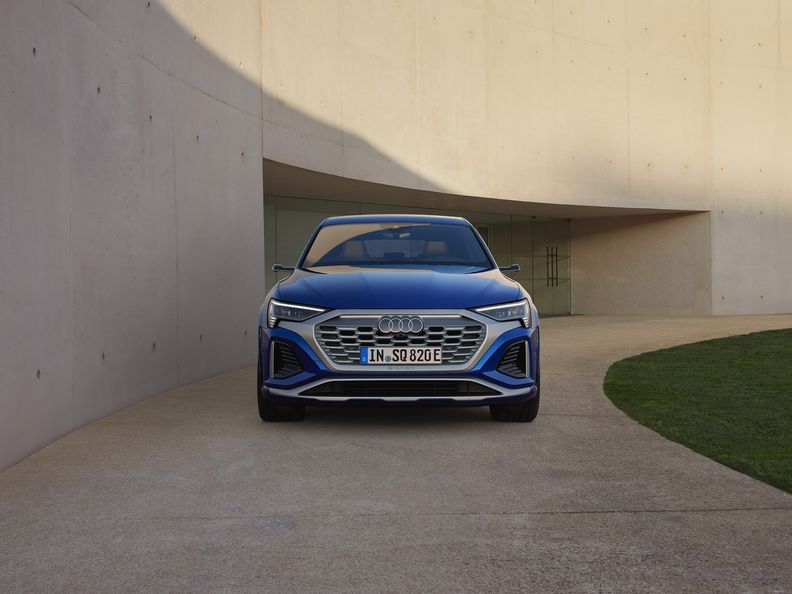Taking dynamics to a whole new level
Audi SQ8 Sportback e-tron: Power consumption (combined) in kWh/100 km: 27.2–24.4CO₂ emissions (combined) in g/km: 0CO₂ emission class: A
Audi SQ8 Sportback e-tron: Power consumption (combined) in kWh/100 km: 27.2–24.4CO₂ emissions (combined) in g/km: 0CO₂ emission class: A
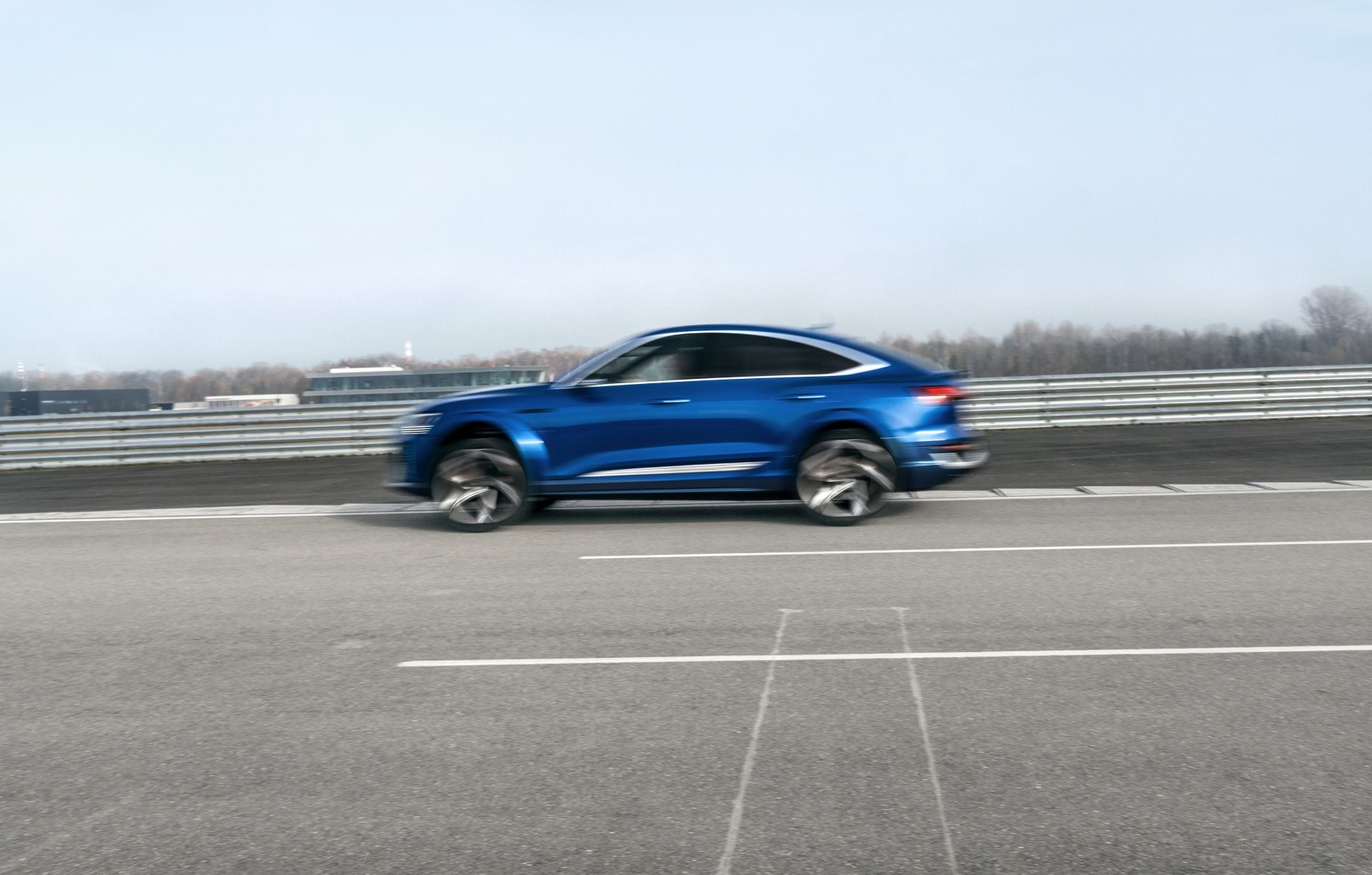
Audi SQ8 Sportback e-tron: Power consumption (combined) in kWh/100 km: 27.2–24.4CO₂ emissions (combined) in g/km: 0CO₂ emission class: A
Audi SQ8 Sportback e-tron: Power consumption (combined) in kWh/100 km: 27.2–24.4CO₂ emissions (combined) in g/km: 0CO₂ emission class: A
Fog has settled like a veil over the grounds of the Audi driving experience center in Neuburg an der Donau. It is not unusual for Audi customers or test drivers to gain experience and knowledge about vehicle handling and performance at the center. Rolf Volland is familiar with the handling of sporty vehicles and knows both the motorsport perspective and that of customers from his many years of experience as a racing driver and as an instructor at the Audi driving experience.
The training offered as part of the Audi driving experience and described in the following text took place on a closed-off track under the guidance of professional instructors. The driving techniques taught during the training sessions may only be used on public roads if they are compatible with road traffic regulations.
The training offered as part of the Audi driving experience and described in the following text took place on a closed-off track under the guidance of professional instructors. The driving techniques taught during the training sessions may only be used on public roads if they are compatible with road traffic regulations.
“With two e-motors on the rear axle, there are new handling possibilities in terms of driving dynamics.”
At the access barrier to the track, Volland brings the blue Audi SQ8 Sportback e-tron to a brief halt. From here, it’s not far to the driving safety training track and the handling course. “When handling electric vehicles, we have almost perfect responsiveness from below and significantly better traction,” Rolf Volland explains. The low centre of gravity due to the battery in the underbody makes for very good handling. However, a much more precise and smarter control of the drive is crucial. “With two e-motors on the rear axle alone, as installed in the Audi SQ8 Sportback e-tron, there are completely new handling possibilities in terms of driving dynamics.”
Audi SQ8 Sportback e-tron: Power consumption (combined) in kWh/100 km: 27.2–24.4CO₂ emissions (combined) in g/km: 0CO₂ emission class: A
Audi SQ8 Sportback e-tron: Power consumption (combined) in kWh/100 km: 27.2–24.4CO₂ emissions (combined) in g/km: 0CO₂ emission class: A
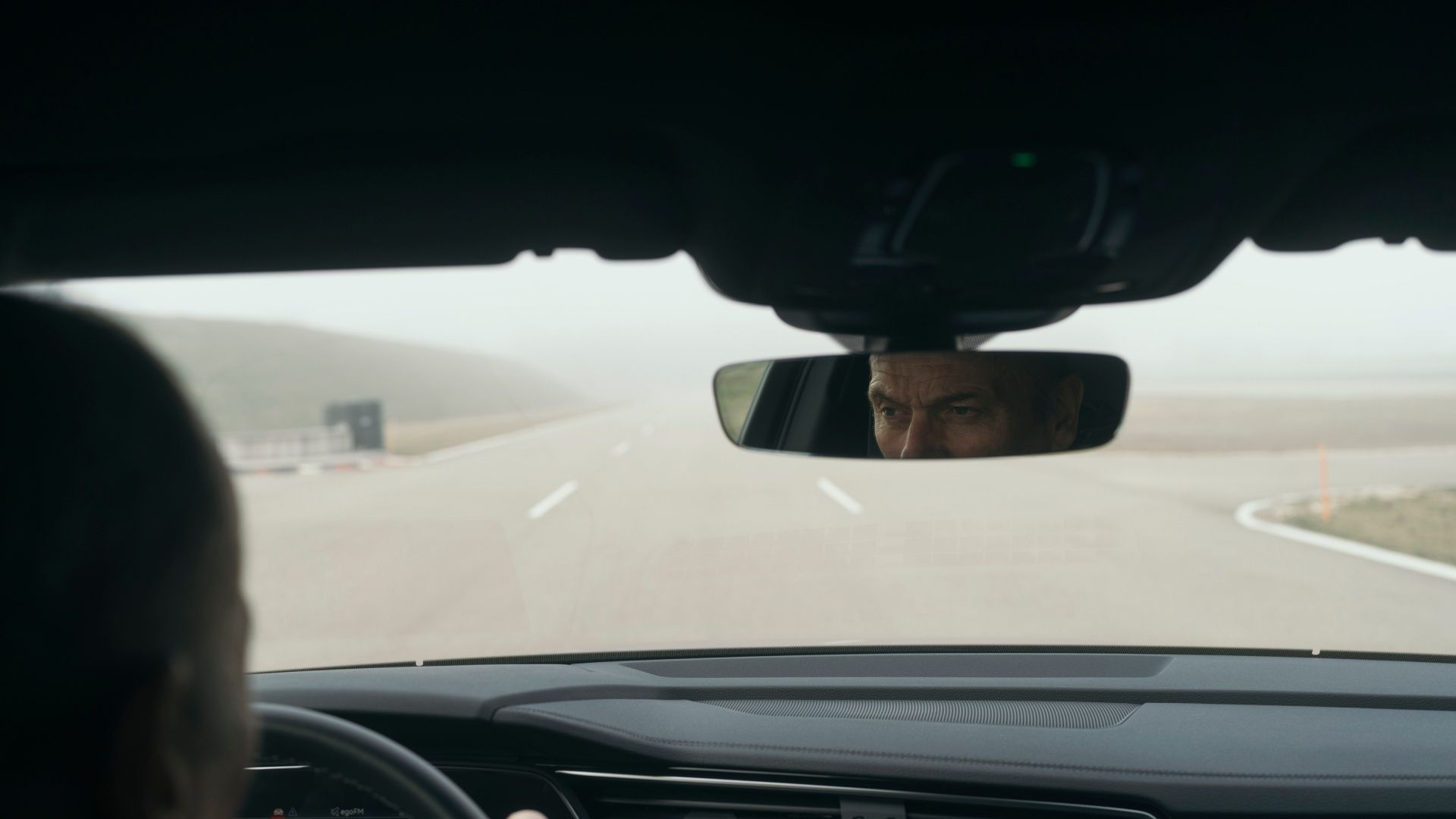
Audi SQ8 Sportback e-tron: Power consumption (combined) in kWh/100 km: 27.2–24.4CO₂ emissions (combined) in g/km: 0CO₂ emission class: A
Professional driver, closed-off track. Do not attempt.
Audi SQ8 Sportback e-tron: Power consumption (combined) in kWh/100 km: 27.2–24.4CO₂ emissions (combined) in g/km: 0CO₂ emission class: A
Professional driver, closed-off track. Do not attempt.
Volland now demonstrates what this means, accelerating to 90 km/h on the first straight. Then he brakes briefly and steers the Audi SQ8 Sportback e-tron in a decidedly tight radius into the first 180-degree turn. “There are enormous forces at work,” he says, while at the same time holding the line with almost playful ease. “The wheel on the inside of the turn runs with less torque than the wheel on the outside. Normally, a classic differential would now regulate the different wheel speeds through brake pulses.” But that is not the case with the electric torque vectoring of the all-electric Audi SQ8 Sportback e-tron. In the latest expansion stage of the quattro drive, optimal drive distribution is the key. “The torque distribution can be individually adjusted by the two electric motors, each driving a rear wheel,” Volland explains and accelerates out of the corner. “The torque is now higher on the wheel on the outside of the turn.” The torque difference is up to 220 Newton metres, and at the wheels it is approximately 2,100 Newton metres due to the gear ratio, “which in the end means an even more cornering-friendly vehicle,” says Volland.
But torque vectoring is not defined by the three electric motors alone; it is rather their smart interaction. The car now enters the long corner at close to 100 km/h, and Volland tests the traction capabilities of the Audi SQ8 Sportback e-tron. “How fast am I going? What’s my steering angle? What is the position of my accelerator pedal? How much grip does the vehicle have? All this results in millions of data that are evaluated in fractions of a second and processed into handling instructions for the three e-motors. And this happens uninterruptedly and continuously.”
Audi SQ8 Sportback e-tron: Power consumption (combined) in kWh/100 km: 27.2–24.4CO₂ emissions (combined) in g/km: 0CO₂ emission class: A
Audi SQ8 Sportback e-tron: Power consumption (combined) in kWh/100 km: 27.2–24.4CO₂ emissions (combined) in g/km: 0CO₂ emission class: A
“Millions of data are evaluated in fractions of a second and processed into handling instructions.”
The advantages, according to Volland, are not only evident when driving fast around corners. Rolf Volland manoeuvres the all-electric Audi SQ8 Sportback e-tron to the off-road course of the Audi driving experience. On a section with staggered stone hills, vehicles are made to lean over the transverse axis. As a result, the diagonally opposite wheels hang in the air on the crest of the hill. And that’s exactly where Rolf Volland wants the all-electric SUV to be: “At the moment when the front wheel is hanging in the air, there is a braking impulse, and the power is transferred to the other wheel. That’s how the differential works on the front axle. In the rear, on the other hand, it needs no brake intervention. The individual wheels are controlled as needed.” In off-road mode, which Volland selects in the vehicle, the electric torque vectoring then also reacts more as needed and more directly than conventional drive systems. “Of course, when it comes to the driving experience, it’s always better when something is driven and not braked,” Volland says, true to his race driver personality.
The Audi SQ8 Sportback e-tron still has to tackle an incline of 55 percent. This will prove how smart the electric torque vectoring is, but it will also show the power of the SUV. “Electric vehicles don’t have a classic transmission. When starting up on an incline of 55 percent, you need all the more power on the rear axle and optimum traction of the vehicle,” Volland explains, accelerating effortlessly up the hill.
Audi SQ8 Sportback e-tron: Power consumption (combined) in kWh/100 km: 27.2–24.4CO₂ emissions (combined) in g/km: 0CO₂ emission class: A
Audi SQ8 Sportback e-tron: Power consumption (combined) in kWh/100 km: 27.2–24.4CO₂ emissions (combined) in g/km: 0CO₂ emission class: A
When the work is done, Rolf Volland parks the Audi SQ8 Sportback e-tron in front of the Audi driving experience customer center. “I clearly understand torque vectoring, as installed in the Audi SQ8 Sportback e-tron for the first time, as a performance and driving dynamics feature.” The vehicle, he explains, not only accelerates faster, drives with less friction and is sportier, but at the same time it also offers much more comfort and dynamics in cornering situations. “Highly precise and complex – the way I see it, the triple electric drive and the networking result in a completely new driving experience,” the racing pro concludes. Anyone who denies that an electric car is really fun to drive, he says with a wink and connects the SUV to the charging station, is welcome to book a course at the Audi driving experience.
Audi SQ8 Sportback e-tron: Power consumption (combined) in kWh/100 km: 27.2–24.4CO₂ emissions (combined) in g/km: 0CO₂ emission class: A
Audi SQ8 Sportback e-tron: Power consumption (combined) in kWh/100 km: 27.2–24.4CO₂ emissions (combined) in g/km: 0CO₂ emission class: A
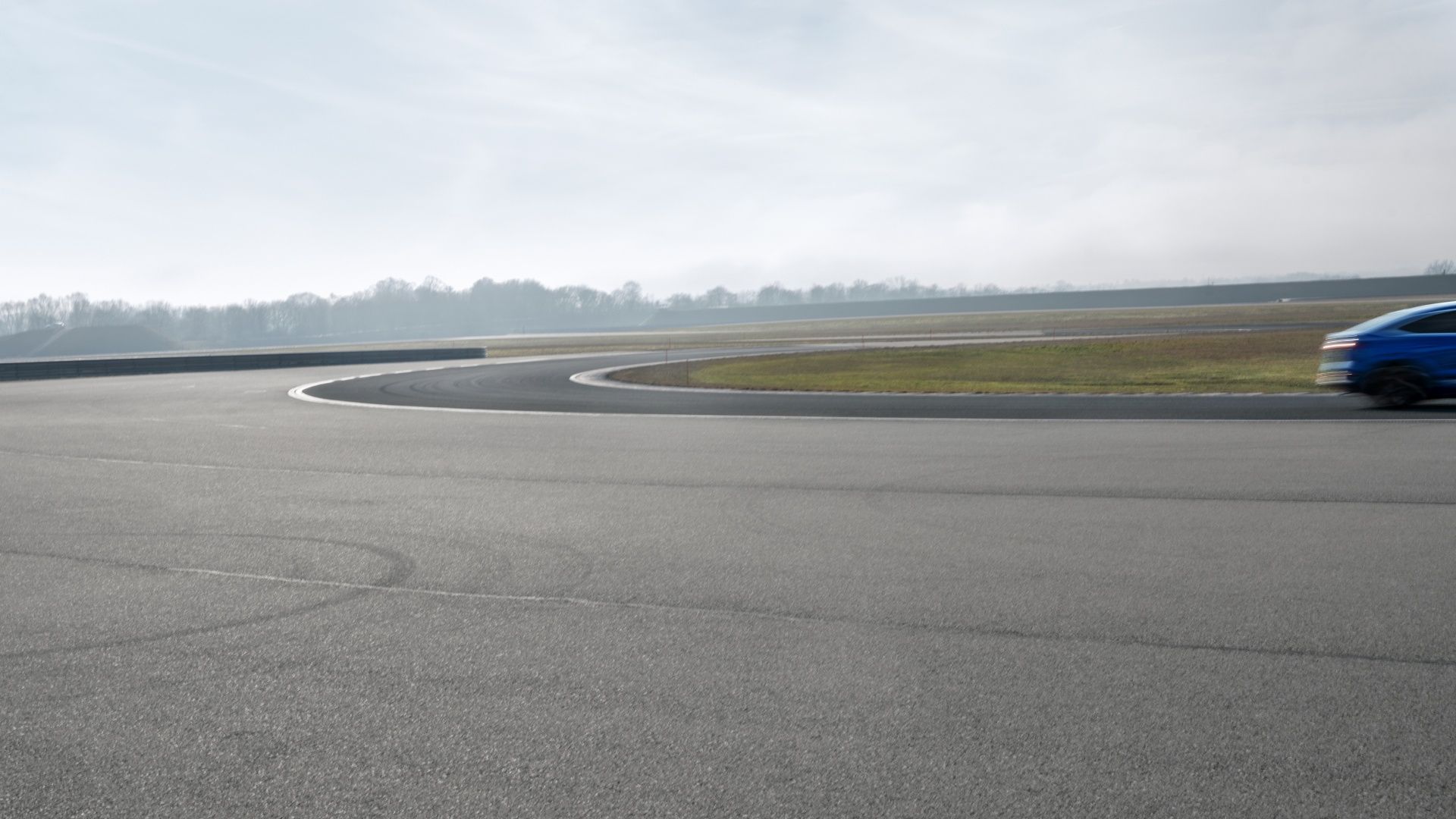
Audi SQ8 Sportback e-tron: Power consumption (combined) in kWh/100 km: 27.2–24.4CO₂ emissions (combined) in g/km: 0CO₂ emission class: A
Professional driver, closed-off track. Do not attempt.
Audi SQ8 Sportback e-tron: Power consumption (combined) in kWh/100 km: 27.2–24.4CO₂ emissions (combined) in g/km: 0CO₂ emission class: A
Professional driver, closed-off track. Do not attempt.
